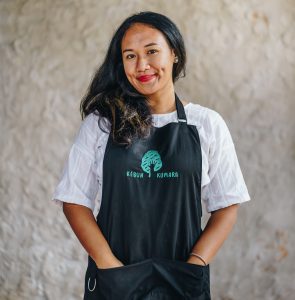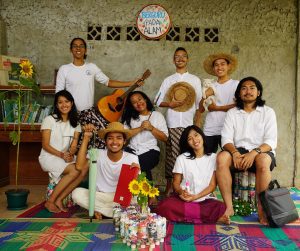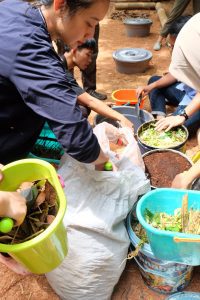Learning to Grow Our Own Food with Kebun Kumara
This feature article is a part of Waste4Change’s initiative to review and introduce several local communities/startup/companies that have contributed in managing food and organic materials so that they do not end up as waste. Managing food materials should not be considered as something trivial, because if it’s not done correctly, food and organic waste will not only pollute the environment but also become a source of emission that will harm the ozone layer.
Waste4Change believes that the initiatives to process and manage organic and food materials that have been done by existing organizations and communities are important, thus they need to be appreciated and acknowledged in order to make more people aware of this important issue. One of those companies is called Kebun Kumara
With a vision to introduce and familiarize city dwellers with green and healthier lifestyles, Kebun Kumara is a social business founded in 2016 by Soraya Cassandra, Dhira Narayana, Alia Ramadhani, dan Rendria Arsyan. The funny thing is that those four people are all related. Two of them are husband and wife, whereas the remaining two people are their sister and in-law.
Waste4Change had the opportunity to know Kebun Kumara even better through a written interview with Sarah Adipayanti, the Learning Coordinator of Kebun Kumara who got her bachelor’s degree in International Relation from Universitas Pelita Harapan.
Let’s get to know more about Kebun Kumara,

Kebun Kumara: Grow Your Own Food #BerguruPadaAlam
What are the main reasons behind the foundation of Kebun Kumara?
Sarah Adipayanti: It started with how urban lifestyle tend to lose its senses and awareness. People who live in big cities often fail to understand the magnitude of the problems that they have created out of their own behavior and daily habits. With such a consumptive lifestyle, we began to forget the origin of our food, and they journey they have gone through to get onto our plates.
Moreover, we also have the following concerns:
- Health: The food that we consume is mostly grown with chemical fertilizer. Our choices of healthy food are usually organic ones, but they are almost always more pricey.
- Waste: With the abundant resources that are available in big cities, waste becomes one of the issues that we need to pay attention to.
We personally like nature, but we realize that all this time our relationship with nature is a one-way relationship. We have been enjoying what nature offers us, to the point that we forgot how it should be reciprocal, that we should have taken good care of nature as well. It’s ironic because we are all “educated” people, but it’s as if we don’t know how to take care of nature.
Humans are essentially a part of nature, but it’s as if that fundamental connection has been severed. Being reconnected with nature has increased our awareness regarding our role in taking care of this one and only planet.
From that point onward, our team started to learn about Permaculture in Yogyakarta and Salatiga, a method on how to care for nature in a way that is sustainable. This method has in fact been implemented by our ancestors and the indigenous people in Indonesia. We want to implement that method in the cities, and that is why we decided to form Kebun Kumara as our learning vessel.
Kebun Kumara itself is located in Taman Wisata Pulau Situ Gintung 3, Ciputat, Tangerang Selatan. We rent some of the lands that was originally unproductive and abandoned. Then we transformed these lands into food garden, composting house, and food forest (currently in redesigning process)
What is Kebun Kumara’s take on the fact that Indonesia is the second-biggest producer of food waste globally, and that food waste is one of the reasons for ozone depletion?
Sarah Adipayanti: Originally, nature does not produce any waste. The natural cycle is so perfect to the point that nothing goes to waste. Unfortunately, this cycle is disrupted by humanity’s ignorance. The disposal of food remains to landfills hinders the decomposition process and resulted to other problems. One example is the release of methane gas into the atmosphere, which is one of the causes of global warming.
If every person is willing to be responsible with their own organic waste and compost them instead, imagine how much organic waste that we can utilize and divert from being disposed to landfills. Composting is easy, we don’t need to work that had to decompose those waste. Nature has provided the necessary organisms and substances that will perform its roles to decompose our organic waste. We only need to segregate waste.
That is why we try to raise this issue and facilitate people who are willing to start managing their organic waste through our workshop activities. We hope that when the participants went back home, they can start to compost their own organic waste with ease. In addition, they can also learn to reduce the number of food scraps and organic waste that will end up in landfills, starting from their own house.
What are the programs that are conducted by Kebun Kumara, and how many people/foundation/organization that has been involved in Kebun Kumara’s activities?
Sarah Adipayanti: Our business is focused on three things, namely educating about caring for nature and environment through gardening, composting, and also eco brick. Furthermore, we also sell seeds and provide a service called edible landscaping service.



Edible Landscaping Service is a service in which we help to design and provide construction services for houses, schools, or other places that want to have their own food garden. In every food garden that we design, the composting facilities are customized according to each of the places (be it large scale or small scale). This way, they will be able to harvest food from their own garden and manage their organic waste into compost. This is a win-win solution since the compost will also be used for their plants.
Kebun Kumara’s core team consists of 6 people, and they are made up of 2 farmers, 2 interns, and around 20 freelancers who often help in becoming facilitators for children workshop. In a year there are around 90-100 activities including workshops, events, and talks.



In addition, we usually close the year with a No Pollution Resolution campaign, each year with a different campaign. The point is that we want to encourage people to exchange their waste with seeds. This is an effort to reduce their personal waste by exchanging the things that they no longer used, but still in good shape such as clothes, CDs, etc, with free seeds.



In the future, we plan to build a food forest our own garden. It’s basically a garden too, but instead of vegetables, we’ll grow fruits in it. This way, we can also harvest some fruits and make it as an example. We are also developing a new curriculum for training. It does not only include gardening but also include a workshop about permaculture for cities, or urban permaculture.
Kebun Kumara has also cooperated with various companies and organizations, such as with Street Store Indonesia, Daur.id, General Electric Volunteers, ABM Group, PGE Kamojang, Shell Retail Indonesia, TEDx Jakarta, PetroChina, PT.Tunas Inti Abadi, Universitas Trisakti, UHAMKA, Lingkaran & Project Semesta, Agradaya, AgriProFocus & Duta Petani Muda, Snuggle Up Kids, and Nestle Pop-Up Daycare
Besides companies and organizations, Kebun Kumara also collaborates with schools and other local communities such as Cikal Elementary School and Kindergarten, Highscope Kindergarten, Tunas Global Elementary School, Cita Persada Elementary School, Dian Harapan Elementary School, The Little Hijabi Homeschooling, Raffles Junior High School, Lanjut Sekolah Foundation, Kenali Nusantara, Komunitas Jendela, AIESEC, IFGF Kids, St Thomas Rasul Church, as well as HKBP Menteng Church.
Waste4Change: What are some tips from Kebun Kumara in managing leftover food so it does not end up as waste, or tips to live more responsibly for the goodness of nature and to appreciate what earth has given us?
Sarah Adipayanti: Starting from our eating habit, we need to consume our food in a sufficient amount. Even if there is leftover food, be wise in segregating and decomposing it.
Start to make your own system at home. Put some buckets for organic waste in places that might generate organic waste such as kitchen, tea and coffee counter, or on the yard where there are many dry leaves and twigs. If the buckets start to get full, you can compost them directly. Make sure that you clean the buckets thoroughly after use to prevent bad odor. Unpleasant smell from composting bin is what usually makes people become lazy to maintain their composting habit.
As time goes by, the process of composting our organic waste can change our perspective regarding nature and other living creatures who have their own roles in this universe.



Kebun Kumara believes that everyone can participate in gardening.
Mother nature itself does not generate any waste, they always decompose it. So why can’t we process our leftover food and other organic waste to be something more beneficial, such as compost? ?
Read the article in Indonesian version in here.



